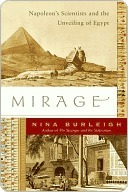More on this book
Kindle Notes & Highlights
Read between
July 25 - September 4, 2017
Napoleon distributed Arabic translations of Tom Paine’s The Rights of Man to the learned class of Egyptians, to further bolster what he hoped would be the Arabs’ latent revolutionary spirit.
How he was able to so nearly guess the real age of the Pyramids a half-century before archaeologists determined it is one of the legendary Napoleonic mysteries.
In Europe, Napoleon’s army ate by forcing people it “liberated” to pay for their own liberation with food and wine.
One of the scholars, an Orientalist and interpreter named Panhusen, disappeared in the streets of Alexandria the day after the savants landed and was never seen again, presumed murdered.
The savants watched as the Arabs began setting small fires all along the coast, burning the debris of the vessels as it washed ashore. The Arabs were not busy making funeral pyres for the French dead. They were burning the wrecked wood to salvage nails. Egyptian peasants had little access to metal, let alone nails. Most of the raw and refined materials taken for granted in France were scanty in Egypt. As the scholars surveyed the ghastly beach scene, and tiny fires burned the last scraps of their lifeline to home, they understood that there was little difference now between them and the native
...more
“foster the spread of enlightenment and knowledge in Egypt.”
Field doctors a century later, in World War I, noticed the maggots might actually speed the healing, if only patients could bear the itching.
Once freed, they grew beards to symbolize their freedom.
In a letter to Cuvier, Geoffroy Saint-Hilaire explained that beardless men were assumed to be slaves, so he and the other French savants stopped shaving. Some also took up the water pipe. Published drawings of them at work, nevertheless, show them always clean-shaven and in frock coats, perhaps in a nod to European sensibilities.
For the rest of their stay in Egypt, the scientists worried more about French soldiers raiding their collections, than about being robbed by Egyptian bandits or ambushed by military foes.
These fanatics—the French called them “Meccans”—were answering a call for help Murad had sent to the religious leaders of Jedda, and they served themselves up as willing cannon fodder, astonishing witnesses like Denon with their sacrifice. Napoleon later wrote of them: “Their ferocity is equaled only by the misery of their standard of life, exposed as they are, day by day, to the hot sand, the burning sun, without water.”


